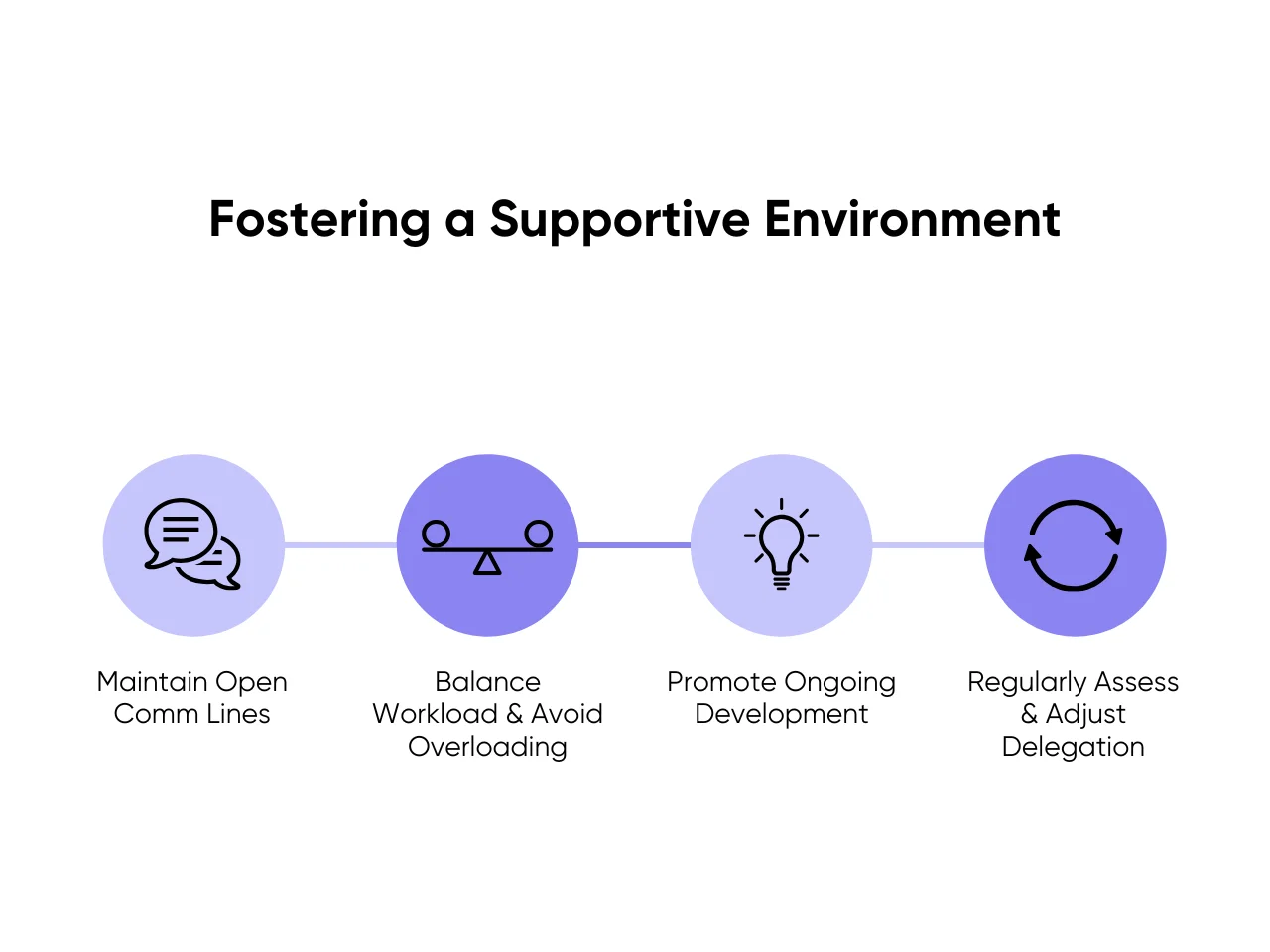Catena is now Pearl Talent! Same mission, new name.
A heavy workload can feel overwhelming, especially when managing many responsibilities. Effective delegation helps you handle tasks more efficiently and gives you time to focus on more important work. When you know how to delegate properly, it boosts productivity and helps your team grow. Using the proper examples of delegation in the workplace can turn a chaotic environment into a more organized and successful one.
As an expert service placement provider, Pearl Talent excels at matching businesses with top-tier professionals who are experts in task delegation. We have a vast talent pool of highly skilled individuals ready to handle a variety of responsibilities, ensuring that your business runs smoothly and efficiently. With our help, you can confidently delegate tasks to the right professionals, allowing you to focus on what truly matters for your company's growth and success.
With our many successful placements across various industries, we have seen firsthand how effective delegation can transform businesses. In this blog, we will explore 11 examples of delegation in the workplace and highlight best practices to consider when delegating tasks. Afterward, you'll understand how to delegate more efficiently and boost your team's productivity.
Let’s dive in!
Why Is It Important To Delegate Tasks Effectively?
When it comes to effective workplace management, delegation of tasks to executive assistants is essential. Rather than handling all the routine or administrative work yourself, you can depend on your assistants to manage it. This, in turn, lets you focus on your primary responsibilities and make critical decisions.
Moreover, effective delegation ensures that everything continues to run smoothly, even in your absence. Sharing tasks with your assistant prevents specific duties from depending solely on you. If something unexpected arises or you're caught up with other tasks, your assistant can keep things moving. These are practical examples of delegation in the workplace.
11 Examples of Delegation in the Workplace Done Right
Effective delegation is crucial for success and productivity in any workplace. It helps reduce workload, improve efficiency, and allow team members to develop their skills. Here are 11 examples of delegation in the workplace done right, showcasing how to delegate tasks efficiently and empower your team.
Administrative Delegation Examples

Administrative delegation is a crucial skill that helps businesses run efficiently by distributing tasks across the team. Here are some administrative examples of delegation in the workplace.
1. Delegating Strategic Calendar Management
Managing a busy calendar can take up much time, especially for an executive with many tasks and meetings. Delegating calendar management is an excellent example of delegation in the workplace, allowing the executive to focus on high-priority responsibilities.
For instance, Alex, a busy executive, delegates his calendar tasks to his assistant, Sarah. Using the best calendar management tools, Sarah takes over the scheduling, avoids conflicts, and prioritizes key events, allowing Alex to focus on business strategies and client meetings.
2. Tasking Executive Assistant With Email Management
Managing email can be time-consuming, especially for executives with a high daily volume. Delegating email management to a trusted assistant allows them to focus on higher priorities. With an assistant handling routine emails, the executive can stay organized and avoid missing important messages.
Consider this scenario: Lisa, an executive, finds her inbox constantly overflowing. She delegates email management to her assistant, John, to free up her time. John filters out spam, replies to routine questions, and flags urgent messages for Lisa, helping her stay connected and focused on important tasks.
3. Allocating the Task of Meeting Coordination & Preparation
Managing multiple meetings and conferences can overwhelm even the most organized executive. A smart example of delegation in the workplace is when an executive assigns meeting coordination to an assistant, freeing up time for more critical tasks.
For example, Luke, a busy executive, delegates meeting scheduling, invitations, and agenda preparation to his assistant, Mia. Mia handles all the details, allowing Luke to focus on the content and objectives of the meetings without distractions.
4. Tasking Executive Assistant With Research & Information Gathering
Research and information gathering are essential for executives to stay updated on industry trends and competitors. However, these tasks can take a lot of work. Many examples of delegation in the workplace show that assigning research to a skilled assistant can be a smart move.
To give you an idea, Maria, an executive, decides to delegate research duties to her assistant, Michael. She trusts him to collect, summarize, and organize essential information into concise reports. With Michael handling the details, Maria saves time and can focus on using his insights to make informed decisions.
Operational & Logistical Delegation Examples

Every business relies on smooth operations and efficient logistics to thrive. Below are some operational and logistical examples of delegation in the workplace that demonstrate how tasks can be assigned effectively to keep everything running smoothly.
5. Assigning Responsibility for Travel Arrangements & Itinerary Planning
Delegating travel arrangements and itineraries to a trusted assistant helps executives focus on more important activities, like preparing for crucial meetings. This is one excellent example of delegation in the workplace, where assistants handle logistical details, saving time for their executives.
For example, Ava, the CEO of a successful company, has a packed travel schedule. She hands over the responsibility of booking flights, arranging accommodations, and planning itineraries to her assistant, Mark. Thanks to Mark’s organization, Ava can focus on her work and is confident that her travel plans are in good hands.
6. Vendor & Supplier Management
Vendors and supplier management can take up much time, especially in busy workplaces. One example of delegation in the workplace in this field is when an office manager hands over this responsibility to an assistant to ensure smooth operations.
To illustrate, Jake, the office manager at a medical clinic, delegates vendor and supplier management tasks to his assistant, Ella. Ella handles placing orders, managing inventory, and resolving issues, allowing Jake to focus on more pressing matters like staff schedules and patient care.
7. Delegating Budget Monitoring & Expense Tracking
Budgeting and expense tracking can be overwhelming, especially when juggling other responsibilities. An example of delegation in the workplace is when a manager hands over these tasks to an assistant with expertise in financial management.
For example, Cole, the manager of a marketing firm, delegates budgeting and expense monitoring to his executive assistant, Emma, who has a finance background. Emma handles tasks like reconciling financial statements, tracking expenses, and generating reports, allowing Cole to focus on business growth and client relationships.
Client & Customer Relations Delegation Examples

A good client relationship is key to business success and long-term growth. Let's explore CRM examples of delegation in the workplace to see how delegating these tasks can improve service and strengthen client bonds.
8. Assigning Customer Relationship Management Duties
Customer relationship duties can take up much time, especially for small business owners. Another example of delegation in the workplace is when a business owner delegates CRM tasks to a trusted team member.
For example, Jane, the owner of Sunshine Electronics, delegates responsibilities like responding to customer inquiries, managing data, and following up on sales leads to her employee, Zoe. Over time, Jane sees the benefits of delegating these tasks as customer interactions improve and sales leads are effectively managed.
9. Clinical Support Duties
Clinical support duties can be overwhelming in a medical environment, especially for registered nurses. By assigning tasks to capable medical assistants, nurses can focus on critical responsibilities that require their expertise.
For example, Lily selects a team of nursing assistants and assigns tasks like taking vital signs and assisting with daily activities. By doing this, Lily can focus on critical tasks, such as administering medication and coordinating care, leading to better patient outcomes. This delegation helps the entire team work more effectively, improving patient outcomes.
Project & Recruitment Delegation Examples

Project management and recruitment are key to business growth and success. Here are some project and recruitment examples of delegation in the workplace, showing how delegating these tasks improves efficiency and ensures the right talent is hired.
10. Assigning Responsibility for Project Coordination & Follow-Up
Project coordination and follow-up can be overwhelming, especially when managing multiple tasks and deadlines. Delegating these responsibilities to a trusted assistant helps keep everything on track and ensures timely progress. For instance, Tom, who runs a construction company, is overwhelmed by the number of ongoing projects.
He delegates project coordination to his assistant, Grace, who handles timelines, communicates with contractors, and meets deadlines. This is an excellent example of delegation in the workplace, where assistants manage the logistics and communication involved in complex projects.
11. Allocating Recruitment & Onboarding Duties
Recruiting and bringing in new hires would take time for a busy CEO. However, delegating to a trusted assistant guarantees efficiency while the leader focuses on strategic goals. For example, Maya is an effective leader at TechSolutions and now realizes that hiring talent will be time-consuming for her.
To lighten the workload, she delegates the task of recruitment and onboarding to Owen, who assists her by posting job advertisements, reviewing all the resumes submitted, and scheduling interviews. This is another excellent example of workplace delegation, where an assistant becomes responsible for the hiring process by making the workflow less complicated.
How to Delegate Effectively: 10 Best Practices for Task Delegation
Effective delegation is a skill that improves with practice. It's not just about giving tasks to others; it's a strategy that boosts productivity, encourages growth, and empowers teams. Based on examples of delegation in the workplace, let's explore some simple delegation tips that will ease your workload and help your team grow.
Setting Up for Success

Success in task delegation starts with a clear plan and the right mindset. Here are some tips for effectively delegating tasks, ensuring that they are performed smoothly and that your team performs at its best.
1. Clearly Define Responsibilities & Expectations
When you delegate tasks, clarify what needs to be done and what you expect of the EA. Be specific while giving clear instructions so everything about the executive assistant’s responsibilities and duties is transparent. For example, if you want your EA to produce a report, you must describe the date when you expect it to be completed, the format it should take, and even the key points it should present.
2. Assign Tasks Based on Individual Strengths & Skills
When you delegate to your executive assistant, consider the strengths they bring to the team. When you have a member of your team who's good at graphic design, you automatically have them do a lot of design-related work. For this reason, you're utilizing their strengths and skills, so you'll be apt to accomplish the right tasks with them. So always play to your assistant's strengths and leverage them to get the best outcomes.
3. Provide Proper Training & Resources
If someone is new to a task or lacks experience, take the time to train them properly on how to delegate the work effectively. Offer guidance, share best practices, and provide any materials or tools they need to accomplish the task efficiently. Remember, setting your team up for success is crucial for effective delegation.
Ensuring Smooth Workflow
To ensure the successful outcome of any examples of delegation in the workplace, a smooth workflow is essential for maintaining productivity and team morale. Below are tips on ensuring efficient task management and creating a seamless, effective environment for everyone involved.
4. Establish a System for Task Prioritization
Communicate the order of importance for each task so that your team knows which ones to tackle first. This helps prevent confusion and ensures that critical tasks are completed on time. You can use labels like "urgent," "high-priority," or "low-priority" to indicate the level of importance.
5. Conduct Regular Check-Ins & Feedback Sessions
Schedule brief meetings or quick updates to discuss the status of delegated tasks and address any questions or concerns. Additionally, constructive feedback should be provided to acknowledge their efforts and help them improve. This communication loop helps keep everyone on track and ensures the successful completion of tasks.
6. Empower Executive Assistants to Make Decisions Within Their Scope
Executive assistants are like your right-hand people; trusting their judgment is essential. When you let them make decisions independently, you reduce your workload and boost their confidence and morale. With the freedom to use delegation skills, they can handle tasks more efficiently and get things done every time.
Fostering a Supportive Environment

A supportive environment is critical to successful delegation, as it encourages teamwork and trust among colleagues. The following are tips on creating a positive atmosphere through practical examples of delegation in the workplace.
7. Maintain Open Communication Lines
Establish clear communication channels with your team members, especially your executive assistants. Regularly check in with them to make sure everything is going smoothly. Encourage your executive assistants to provide updates on their progress, ask questions, and get clarification when needed. When communication is open and honest, everyone can stay on the same page, and problems can be resolved quickly.
8. Balance Workload & Avoid Overloading
Before assigning additional responsibilities, look at their current workload and availability. Consider their capabilities and ensure the workload is evenly distributed among the team. Overloading your executive assistants with too much work will cause burnout and mistakes. Instead, prioritize the delegation of tasks based on their skills and availability. This way, you ensure a fair work distribution and that everyone feels safe.
9. Encourage Ongoing Professional Development
Provide opportunities for your executive assistants to enhance their skills through training programs, workshops, or conferences. Investing in their growth benefits them and increases their value to your team. When they have the chance to learn new things, they can take on more challenging tasks and contribute innovative ideas.
10. Regularly Assess & Adjust Delegation Strategies
Make it a habit to assess and adjust your delegation strategies regularly. By reviewing examples of delegation in the workplace, you can see if tasks were completed successfully and on time. Consider the strengths and weaknesses of your team members and adjust task allocation accordingly. If additional support or training is needed, address it to improve productivity and enhance the delegation process.
Key Takeaway
Effective delegation is a key skill that can drastically improve workplace productivity and team performance. In fact, by learning how to delegate tasks appropriately, you can lighten your workload while empowering your team to grow. Furthermore, examples of delegation in the workplace show that when responsibilities are shared appropriately, tasks are completed more efficiently, and team members feel valued.
Clear communication is essential to success. It ensures everyone knows what is expected of them and how to approach the task. In addition, regular check-ins and feedback will help keep tasks on track and provide support when needed. Ultimately, the right approach to delegation will lead to smoother workflows, more time for strategic work, and a more motivated, skilled team.
Want to experience the benefits of delegation in your workplace but need help knowing where to start? Pearl Talent can help you streamline your operations by providing expert staffing solutions tailored to your needs. Fill out our hire form today to build a more efficient, productive team!
Frequently Asked Questions
Originally Published
July 28, 2023




.svg)








.png)









